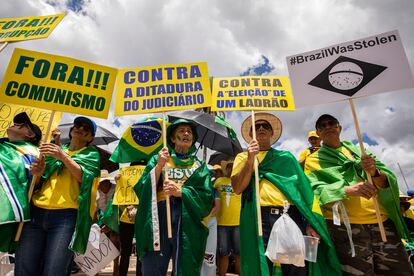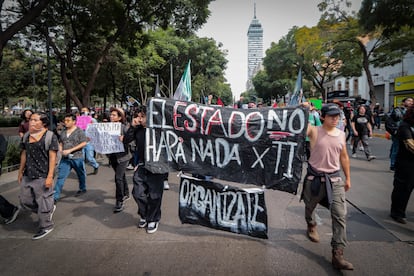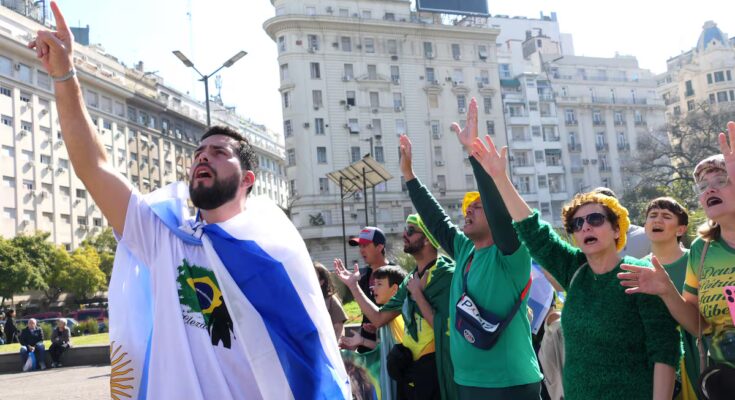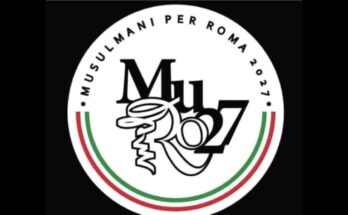Brazil was the first laboratory of the new digital weapons of the Latin American far right. The success was so resounding that a provocative and almost unknown lawmaker named Jair Messias Bolsonaro became president in January 2019. Four years later, it was the turn of Javier Milei, a vociferous, curly-haired Argentine economist. The far-right phenomenon is growing in Chile, led by presidential candidate Axel Kaiser, and is trying to assert itself in Mexico, where it is still looking for a figure to represent it. The strategy is always the same: armies of digital mercenaries spread the sass outside of traditional media. On X, TikTok, Instagram, Facebook, programs streaming and online newspapers call for revolt and civil disobedience – if not a coup – and organize “spontaneous” demonstrations to overthrow the establishment. Like the one that will be held this Saturday in Mexico City against the government of Claudia Sheinbaum.
In Mexico, the far right has so far had little popular resonance and no institutional presence. There are only two projects that aspire to become parties before the 2027 midterm elections. One of them is led by the actor Eduardo Verástegui, who has a good relationship with the Argentine Milei. The love between the two was short-lived: an unexpected exchange of insults
Given the lack of electoral representation, the presence of the Mexican conservative movement is concentrated, for now, on social networks. The controversial call for a demonstration attributed to young people from Generation Z was born. Although it is presented as a spontaneous movement similar to those agitating Nepal, Madagascar or Morocco, an investigation by Infodemia – the Mexican government unit dedicated to the analysis of disinformation – claims that it was a “comprehensive digital strategy”. The relationship is put behind us influencersopposition figures and reports linked to Atlas Network, an ultra organization founded in the early 1980s and present in more than 100 countries. According to the report, more than 90 million Mexican pesos (about five million dollars) have been invested in promoting the march over the past month and a half.
The official investigation also indirectly points to the owner of the TV Azteca television station, Ricardo Salinas Pliego. Last Thursday, the Supreme Court ruled against him after years of litigation and ordered him to pay off a tax debt of nearly 50 billion pesos (about $3 billion). The setback has intensified debate over Salinas Pliego’s alleged role in digital campaigns criticizing President Claudia Sheinbaum.
Infodemia traces the origin of the digital campaign to early October, when Azteca Noticias published a report on Generation Z mobilizations outside Mexico. Dozens of accounts then emerged on social networks, with names like generacionz_mx or somosgeneracionzmx, calling for a march this Saturday in the Mexican capital. Nearly 200 accounts promoted the protest on TikTok, 50 of which were created or reactivated in that period, and over 350 groups discussed the issue on Facebook, many of which were managed from abroad.
The content of the messages suddenly changed tone in the first half of last month. Since the assassination of a mayor in Michoacán on November 1, the narrative has shifted from calls for the revocation of the presidential mandate to the government’s alleged inability to address the violence. Infodemia claims that this change has been synchronized.
The relationship indicates the presence of bot from Atlas Network and mentions the Argentinian Fernando Cerimedo, responsible for Milei’s digital campaign until a few months ago. Cerimedo is an old acquaintance of the American Southern Cone. His name has appeared more than 60 times in the police investigation into the coup plot against Luiz Inácio Lula da Silva that landed Jair Bolsonaro in prison last September. He was accused of spreading an alleged investigation questioning the reliability of Brazil’s electoral system to discredit the victory of the leader of the Workers’ Party (PT). Cerimedo was dropped from the investigation in February this year. Police assumed the Argentine had spread “unfounded content” but could not prove he had control over the coup plot.
Bolsonarism has sprouted on social networks. There, far from the radar of the main Brazilian media, the anti-system and anti-corruption speech of a deputy known only for his provocations, a retired army captain, seduced in 2018 millions of compatriots united by a tiredness for traditional politics and a visceral hatred against the PT. Lula was out of the picture, jailed in a corruption case that was overturned years later.
The patriarch of the Bolsonaro clan was so aware of the capital weight of the Internet in his electoral victory – especially WhatsApp messages – that, on the day of his inauguration, his digital campaign strategist, his son Carlos, a city councilor, accompanied him in the Rolls Royce that took the far-right leader to the presidential palace in Brasilia. After the surprising victory, they managed to build from Facebook, Twitter, now
The then president launched a weekly space on Facebook, where, in style Hello Presidentof Hugo Chávez, invited the ministers to boast of the results obtained by the government. The digital militias created by Carlos Bolsonaro when his father came to power function like a well-oiled machine that works online, with influential politicians and related media to launch synchronized attacks on rivals, silence critics or place an issue at the center of national debate. Bolsonaro’s digital ecosystem has even created its own version of Netflix, a streaming service. streaming with films and documentaries that transfer to the audiovisual world that universe that Bolsonarism condenses into God, homeland and family.

The digital world in which Bolsonaro’s most radical supporters breathe, fueled by distorted or false information, has been a fertile ground for thousands of people who in 2022 will falsely believe that the elections were stolen from Bolsonaro. They were convinced to camp for two months in front of the barracks requesting military intervention. And then they launched the assault on the institutional heart of the republic, in Brasilia. Hundreds of them, ordinary Bolsonaro supporters, are serving long sentences for attempted coup while Bolsonaro is waiting for his 27-year prison sentence to become final.
La Derecha Diario, ultra aries
Before Bolsonaro fell from grace, Cerimedo had already returned to Buenos Aires, where since 2012 he had been operating La Derecha Diario, one of the main digital disseminators of far-right ideas and a well-known propagator of hoaxes against anything that smacked of progressivism. His website is not known for its traffic, but his account on X has more than half a million loyal followers who are responsible for the multiplication of the message.
In June 2021, Cerimedo added to the ownership of La Derecha Diario the Spaniard Javier Negre, an agitator who had smelled the bright political future of Milei, then an MP, from Madrid and decided to reinvent himself on the other side of the Atlantic after an unsuccessful journalistic experience in Madrid. The new company was called Madero Media Group SRL and started with a declared capital of 100,000 pesos, just over $1,000 at the exchange rate at the time.
After years of frenetic activity, Cerimedo is now retired from La Derecha Diario, despite still being a founding member, and has broken with the Milei government, dissatisfied with the communication drift of the Casa Rosada. Anyone who wants to contact him personally must travel to La Paz, Bolivia, where he serves as communications advisor to the new president, Santiago Paz. Negre, however, continues to do his work in Buenos Aires, after a brief stay in the United States and Israel, where he went to tell “the truth” about the war in Gaza. In Argentina he soon became popular for his provocations to other journalists during the press conferences of Milei’s former spokesman, Manuel Adorni. Those who treated him then remember him as a “smoke seller” and a “mug” who during the first months of his stay in Buenos Aires tried in vain to buy the Argentine media to expand his influence.
Negre’s shadow finally reached Mexico, when Salinas Pliego offered to finance a local version of La Derecha Diario. It is in this digital ecosystem that this Saturday’s demonstration takes place. Many gods influencers The Mexicans identified by Infodemia have no previous relationship with politics. They are content creators about makeup, video games or music who started posting pro-march messages within a few days.

While Generation Z mobilization has toppled governments in other countries, in Mexico network participation appears to lack sufficient mobilizing power. Even so, President Claudia Sheinbaum ordered metal fences to be placed around the National Palace and historic buildings, while movement reports shared instructions on how to tear them down.



